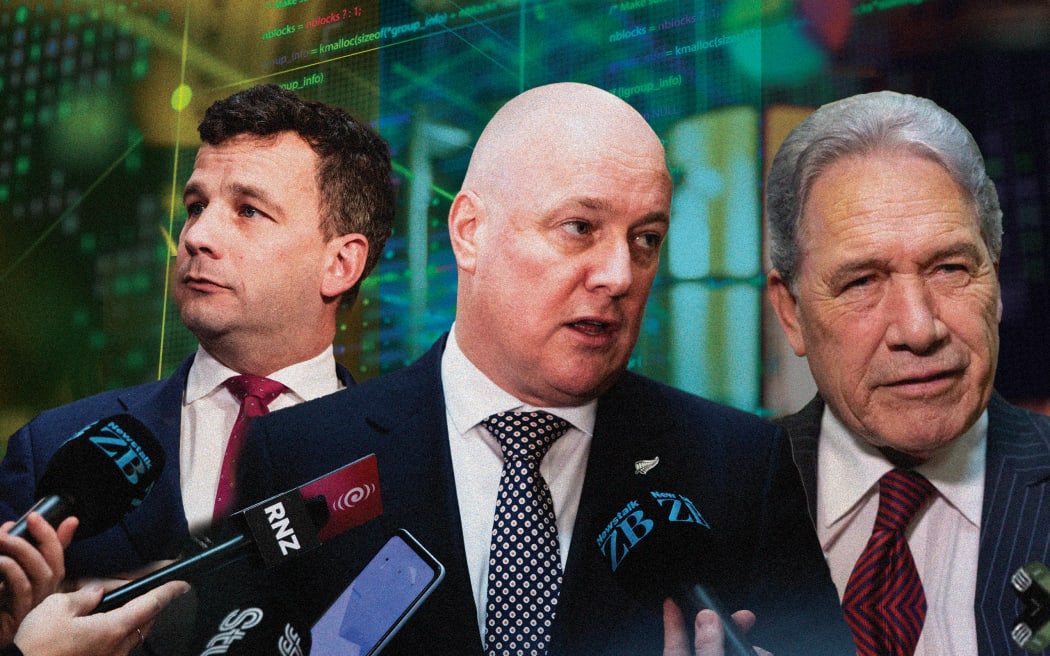
The coalition government made safety a key part of its law and order reforms. Photo: RNZ
More people don't feel any safer than they did twelve months ago than those who do, despite the government making safety a key part of its law and order reforms.
Since entering office, the government has passed a suite of law and order legislation, including banning gang patches and giving police the power to issue dispersal notices, granting police more search powers, restoring Three Strikes legislation and bringing in caps to sentence reductions.
It has also committed to train 500 extra police officers within two years, and has introduced more beat patrols.
The Prime Minister said it is all making a difference to people's safety.
"Yes, I think if you go and talk to Aucklanders at the moment, who were averse to going into the city because they were worried about the threat of crime, they're actually feeling a lot more confident, because they can see the police, they're visible to them, and they appreciate that," Christopher Luxon said.
The RNZ-Reid Research Poll, however, shows only about a quarter of people said they feel safer.
Respondents were asked: "The coalition government has promised to crack down on gangs and toughen up on sentencing. Overall, do you feel safer in your own home and local community, than you did 12 months ago?".
Just over a quarter, 26.9 percent, of people said yes, while 31.5 percent said no.
More than a third - 38.3 percent - of people said they have not had any safety concerns, and 3.2 percent said they did not know.
The responses reflect party loyalty.
National, ACT, and New Zealand First voters were more likely to say they felt safer.
Labour, Green, and Te Pāti Māori voters were more likely to say no.
What did the politicians have to say?
The Prime Minister said crime was coming down, and people were telling him they felt safer.
"There's some good signs. There's more to do, but I think people are feeling safer, and I get that when I move around the country," Luxon said.
Labour leader Chris Hipkins said he would be surprised if there had been much change over the past 18 months, as the level of risk in the community was still about the same as what it was.
"I do think we need to back our police to do what is a tough job. I'm not criticising the work that the police are doing, I'm saying solving crime requires more than slogans," he said.

Labour leader Chris Hipkins said he would be surprised if there had been much change in safety sentiment over the past 18 months. Photo: RNZ / Samuel Rillstone
The Green Party has been vocal in its criticisms of police and the government's law and order policies.
Co-leader Marama Davidson acknowledged people had different experiences.
"As a former prevention of violence minister, this is not new to anybody that victims of violence have often said that they've felt more violated by getting involved with police and courts," she said.
"So we just have to acknowledge that people have different experiences, when it comes to all of our agencies, including police."
ACT said the previous government had "tried being kind" to criminals hoping they would be kind back.
Leader David Seymour said this government had made the safety of innocent people, and consequences for criminals, a priority.
"I believe they demonstrably are safer. You don't see the levels of reporting of a ram raid a week, victimisations are falling. However, if you've done some polling, then it's possible you have a different view," he said.
New Zealand First leader Winston Peters, meanwhile, pointed to more police recruitment, albeit with an admission the target of 500 extra police officers within two years may run "a few weeks" late.
"They'll feel more safe, because we're getting more police. We're getting the numbers up. We'll be slightly behind, but we're still going to get there, and that's the key point," he said.
The Justice Minister said the government was making real progress.
"Our primary target about reducing the number of victims of serious crime is making good progress. We've got a very large law and order platform in place," Paul Goldsmith said.
The Police Minister, Mark Mitchell, said he would like to feel people felt more safe, but it was hard for him to judge.
He credited police, as well as government agencies, residents and ratepayer groups, and business associations for making CBDs safe.
"There's still a ton more work to do," Mitchell said.
"But overall, I think yes, the police have done an outstanding job with the gangs, organised crime. We don't see patches out on the streets anymore, the anecdotal information and feedback that I've had, if you're asking me just on the feedback that I get, yes people do feel safer."
This poll of 1000 people was conducted by Reid Research, using quota sampling and weighting to ensure representative cross section by age, gender and geography. The poll was conducted through online interviews between 21-27 March 2025 and has a maximum margin of error of +/- 3.1 percent at a 95 percent confidence level. The report is available here.
Sign up for Ngā Pitopito Kōrero, a daily newsletter curated by our editors and delivered straight to your inbox every weekday.






